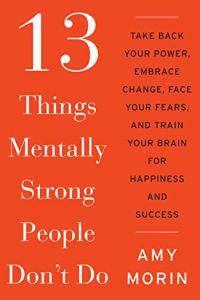Join getAbstract to access the summary!

Join getAbstract to access the summary!
Amy Morin
13 Things Mentally Strong People Don’t Do
Take Back Your Power, Embrace Change, Face Your Fears, and Train Your Brain for Happiness and Success
William Morrow, 2014
What's inside?
Try these mental-health strategies to boost your productivity and happiness at home and at work.
Recommendation
Everyone suffers bad experiences – career disappointments, losses and misfortunes. If you wonder why some people weather setbacks and challenges better than others, psychotherapist Amy Morin has an answer: They practice strategies that help keep them mentally strong. Her explanations of 13 behaviors to avoid and good habits to develop in their place – and the stories she tells with each entry – will spur you to think about how you handle whatever comes your way. getAbstract recommends Morin’s straightforward, relevant counsel to those seeking greater psychological strength in their personal and professional lives. She will help you skip the pity party, see failures as opportunities, not defeats, and find more peace of mind.
Summary
About the Author
Amy Morin is a licensed clinical social worker and a psychotherapist. She contributes regularly to Forbes and Psychology Today.
















Comment on this summary